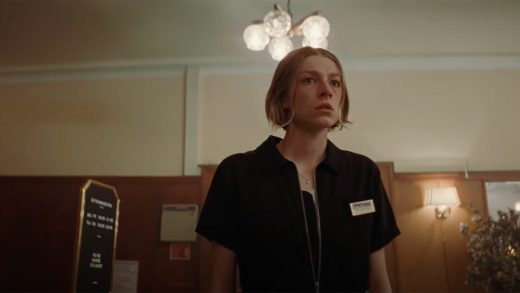I’ve always thought that “complicated relationship” is a bit redundant. Aren’t all relationships, in some sense, complicated? What’s more complicated than weaving two (or more) hearts and minds into a tapestry of shared experience? What’s more complicated than engaging in the delicate dance of give and take, the intricate interplay of emotions and experiences? That said, it’s certainly true that some relationships are more complicated than others. Messier than others. More volatile than others. Sometimes the strange, alchemical reaction between people leads to something brilliant… sometimes it starts a fire. I’ve always been interested in stories that tend toward the latter. Stories about people who ignite a spark in one another. About people who light each other up. People who–for better or worse–transform each other.
My novel Everything’s Fine is about one such relationship. It follows two very different young people as they fall reluctantly, deeply, complicatedly in love. At the center of this entanglement is a liberal Black woman named Jess who falls for a conservative white man named Josh. And as much as the book is about that relationship, it’s also about what it means to be a Black woman navigating predominantly white spaces. It’s about how the experience of being Black, of being a woman, of being a Black woman—“policed by your skin, by your gender, by your existence,” as the writer Jeneé Osterheldt put it—can, depending on the relationship, be at turns nourishing, illuminating, complicating, or even implicating.
This reading list explores books that center Black women in such complicated relationships. While many of these books focus on romantic relationships, others explore a wide range of connections, from mothers and daughters to coworkers and compatriots. What ties these works together is a shared interest in delving into the complex realities of Black women’s lives through the lens of their complicated relationships with others.
New People by Danzy Senna
Newly engaged, Maria and Khalil are a golden couple, literally and figuratively. A pair of Stanford educated bobos living in Brooklyn in the 1990s, their Martha’s Vineyard wedding will be one for the New York Times Style section. They are also each the children of one white and one black parent, golden skinned, the “King and Queen of the Racially Nebulous Prom.” The twist here is that the complicated relationship that powers the novel is not the one between Maria and her fiance, but rather the parasocial relationship between Maria and a poet with whom she develops a troubling infatuation. The poet is Black and dark-skinned where Maria is light-skinned and white passing even though, raised by a single Black mother, she identifies more strongly as Black. It is this disconnect that largely seems to fuel her obsession. But Maria’s journey of racial self discovery quickly becomes a spiral as she begins to stalk the poet, her behavior escalating wildly until it reaches an unsettling climax. A subplot on the Jonestown massacre throws all of the novel’s themes of race, identity and agency in sharp relief. New People is a smart and scathing social satire about how the skin you’re in defines—and confines you.
The Three of Us by Ore Agbaje-Williams
The premise of this one is deceptively simple: what if your husband and your best friend absolutely hated each other? While the premise is simple the story is anything but. Layered and brimming with subtext and sharp observations about money, gender, patriarchy and complicity, this story subverts the love triangle trope by introducing something more akin to a hate triangle. Told in three distinct first person narrations, the novel follows the aforementioned points of the triangle—the unnamed wife, the unnamed husband and the wife’s best friend, named Temi. Over the course of one alcohol fueled afternoon, as years of resentments and recriminations come to a head, allegiances shift, and information is parceled out in neat little poison filled bonbons. By the end, and by design, as the wife is forced to make an impossible choice, you won’t know who’s right, who’s wrong, who’s reliable and who’s not to be trusted, but you will have taken a wicked ride.
American Spy by Lauren Wilkinson
In this Cold War spy thriller, intelligence agent Marie Mitchell is deployed on a covert operation to topple a Marxist regime in Burkina Faso. A Black woman, overlooked and underestimated among her FBI peers, Marie is an unlikely choice to spearhead the mission, although without giving too much away, readers eventually learn that Marie is, in fact, recruited for unlikely reasons. In Burkina Faso, Marie finds her mark—a fictionalized Thomas Sankara—both politically and personally charismatic. As Marie begins to question her relationship with her homeland’s intelligence apparatus—which, by the way, may know more about her sister’s disappearance than it’s letting on—she also begins to fall into a relationship with Sankara that’s dangerous, thrilling, and, yes, complicated.
The Confessions of Frannie Langton by Sara Collins
Gothic murder mystery? Historical fiction about the horrors of slavery? Illicit affair between a former slave and her employer’s wife? Check, check and check. Sara Collins’ strikingly original debut novel tells the story of the eponymous Frannie Langton, a servant and former slave, who is on trial for the murder of her employer and her employer’s wife. Though normally sharp and inquisitive, Frannie can’t remember anything that happened on the night of the murder, and so she tells her lawyer what she does remember: her life story. The novel is told in the form of Frannie’s confession in which she recounts everything from her violent and torturous experiences as a slave on a Jamaica plantation to the love affair at the center of the murder allegations. The word “complicated,” while directionally accurate, doesn’t quite capture all that’s at stake here. Life and death, yes, but also sex and adultery, grief and guilt, injustice and brutality, lies and desire.
Big Friendship: How We Keep Each Other Close by Aminatou Sow and Ann Friedman
Not all love stories are romances. And as the title suggests, Big Friendship, co-authored by best friends and co-hosts of the popular podcast Call Your Girlfriend (2014-2022), is at once an ode to friendship and a travel guide for to traversing the often uncharted territory of, what the authors call a “big friendship.” The book explores their own “big friendship,” which is a close friendship that Sow and Friedman argue is the most influential and important in a person’s life, even though society is reluctant to recognize it as such. The book gives the reader an intimate peek at the machinations of their relationship, its ups and its downs and everything in between. Sow is Black and Friedman is white, and so a lot of the tricky work of sustaining the friendship comes down to navigating their racial differences. Their commitment to one another, and to their friendship, is the beating heart of the book and a powerful reminder that not all complicated relationships are damaging or destructive. Big Friendship is a big hearted celebration of complicated relationships.
Assembly by Natasha Brown
Granta recently named Natasha Brown one of Britain’s best young novelists and the accolade is well deserved. Assembly, her debut novel, about a young Black British woman on the brink, was hailed as equal parts brilliant and biting. And indeed, Brown’s prose is exquisite, eviscerating and economical. In a little more than 100 pages, as the unnamed narrator faces a series of difficult and escalating choices, Brown holds a scalpel to race, class, gender, family, identity, politics, capitalism and colonialism. Although the novel captures the complexity of several different relationships—friends, family, lovers—it is the relationship between the narrator and her colleagues that proves most incendiary. Brown’s examination of those workplace relationships, and the toxic brew of abuse, resentment and dependency that defines them, ultimately gives birth to one of the best lines in contemporary fiction. Regarding a lackluster colleague, the narrator says: “As if each morning, fresh mediocrity slides out of the ocean, slimes its way over mossy rocks and sand, then sprouts skittering appendages that stretch and morph and twist into limbs as it forges on inland until finally, fully formed, Lou! Strolls into the lobby on two flat feet in shined shoes.”
Transcendent Kingdom by Yaa Gyasi
Gyasi may be more well known for her mega hit Homegoing, but Transcendent Kingdom, her sophomore novel, is an absolute achievement as well. A quietly devastating, but ultimately hopeful, meditation on loss, love, and loneliness, Transcendent Kingdom is clearly the work of a writer at the top of her game. The novel follows Gifty, the child of Ghanaian immigrants, now a neuroscience PhD at Stanford. Her brother has died of a heroin overdose and her mother is all but a ghost. Gifty spends her days in the laboratory, experimenting with mice, trying to understand the addiction and depression that have stolen her family. When the novel opens, Gifty’s mother, in the throes of a deep and intractable depression, has moved into Gifty’s apartment, where they both struggle, separately and together, to make sense of their shared tragedy. This delicate relationship is rendered beautifully and, over the course of the novel, as mother and daughter try and fail and try again to map the contours of their fraught relationship, Gyasi raises profound questions around faith, grief, family and belonging.
The post 7 Books About Black Women in Complicated Relationships appeared first on Electric Literature.
Source : 7 Books About Black Women in Complicated Relationships














